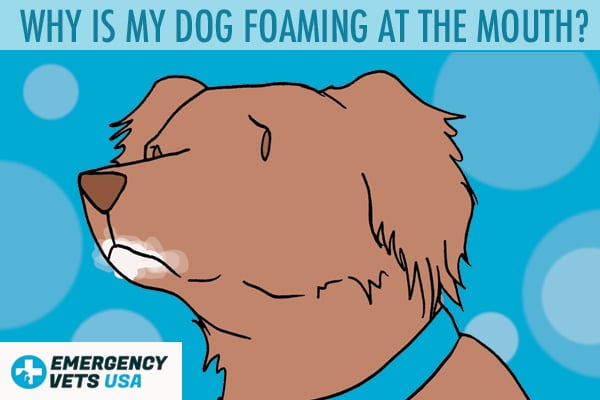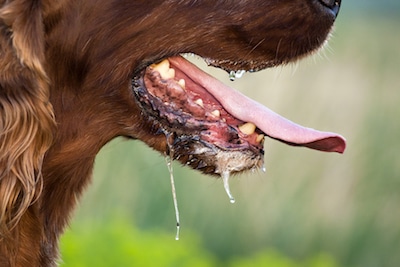Why Is My Dog Foaming At The Mouth
When you think of a dog foaming at the mouth, your mind may instantly jump to theatrical rumors.
Dog frothing at the mouth has been tied to aggression and serious medical issues, but that’s actually quite rare in our furry friends.
So why is your dog foaming at the mouth?
It could be one of many reasons.
Below we list 8 of the most common reasons why our dogs foam at the mouth.
In this article we will introduce you to the behavior of foaming and drooling, and help you understand the many factors behind the strange symptom.

The Difference Between Foaming and Drooling
Before we dive into the behavior of foaming at the mouth in dogs, it’s important to understand the difference between foaming and drooling.
Though some drooling may be completely normal for dogs, it often causes concern when our dog’s drool magically turns into foam.
So what sets drooling and foaming apart?
Though drooling and foaming can mean different things, foaming at the mouth is actually a product of drooling.
Foaming is simply a result of air coming in contact with drool, often when a dog is panting.
The movement of air within a dog’s mouth causes their drool to froth, often resulting in the foaming appearance outside of their mouth.
To help you have a visual, let’s get into the visual differences between drooling and foaming.
Dog Drooling From The Mouth
Drooling in dogs can appear as an elongated teardrop coming from your dog’s mouth.
A dog with excessive drooling may have saliva hanging from each side of their mouth, and they may often have a stoic appearance, often due to nausea.
The appearance of drooling in dogs is obvious, and often hard to miss.
Dog Foaming From The Mouth
Foaming at the mouth in dogs often appears as white foam hanging on either side of the mouth.
Foam or froth in dogs often looks like the foam you may see in a bubble bath, possibly accompanied by streams of drool.
Dogs will often be panting when you see this symptom, likely resulting in more foam around their mouth.
What Causes Dog Foaming?
So why do dogs foam at the mouth?
Frothing or foaming at the mouth can be a result of many different factors in a dog’s environment, often ranging in severity.
In order to help you better understand your foaming canine friend, let’s look into the many reasons why your dog may be foaming at the mouth.
1.) Stress And Anxiety
One of the most common causes behind foaming at the mouth in dogs is stress or anxiety.
Stress in dogs can cause hypersalivation, often accompanied by panting and increased breath rates.
Due to this, a dog’s drool will often turn into frothing foam around their mouth.
This is extremely common in dogs during car rides, trips to the vet, and any other situation that ignites stress in your furry friend.
2.) Nausea
Nausea in dogs is another common reason behind frothing at the mouth.
This along with vomiting can cause a dog to experience hypersalivation, often leading to foaming at the mouth if the dog is panting or breathing heavily.
If your dog is experiencing foaming at the mouth due to nausea, you may also notice additional symptoms of GI upset such as lack of appetite, lethargy, and diarrhea.
Not only can nausea be a cause of frothing due to GI upset, but it can also be a result of motion sickness during car rides.
3.) Over-Exertion
Frothing at the mouth in dogs can be a result of over-exertion or vigorous exercise.
Hyperactivity can cause our dogs to drool and pant, often causing a foaming appearance in our dog’s mouth.
While a small amount of foaming at the mouth after exercise can be completely normal for dogs, it’s important to watch out for any excessive foaming.
A large amount of frothing around the mouth can mean that your dog is over exerting themselves, and are in need of a break.
4.) Foul Taste In Their Mouth
Since our dogs are known for tasting anything they can get their paws on, sometimes they consume something that leaves a foul taste in their mouth.
Our dogs are not able to flush their mouths of overpowering flavors, often resulting in a drooling response.
Frothing at the mouth can happen after dogs eat plants, medications, and any other substance that has a strong taste that a dog is unfamiliar with.
5.) Dental Disease
Dental disease is another common cause of foaming at the mouth in dogs.
Bacteria buildup in the mouth and dental pain can result in excessive drooling, often associated with panting due the discomfort that dental pain causes.
Foaming at the mouth due to dental disease may be accompanied by bad breath, difficulty chewing, blood in their water bowl, and other signs of dental pain.
Serious Causes Of Dog Foaming
While the above factors should be taken seriously, there are a few medical emergencies that can be a factor in dogs foaming at the mouth.
Though these causes are certainly more rare, they should still be on the table any time a dog is foaming at the mouth.
6.) Seizures
Seizures are one of the serious medical emergencies that can cause a dog to foam at the mouth.
Any type of neurological disorder can cause a dog to experience hypersalivation, and the panting that is associated with seizures can cause the drool to foam.
If your dog is seizing or experiencing any other neurological symptoms along with frothing at the mouth, it’s best to contact your vet immediately.
7.) Toxic Substances
Toxic substances and poisonings are another possible cause of excessive drooling or foaming in dogs.
Whether it’s due to the overpowering taste of a substance or the nausea it causes, many dogs will experience foaming at the mouth if they are experiencing a toxicity.
If you fear that your dog has ingested a toxic substance, it’s important to contact your vet as soon as possible for further care.
8.) Rabies
Though rabies is often the first thought of the general public when a dog is foaming at the mouth, this is actually the most unlikely possibility.
Movies and rumors have contributed to this belief in foaming dogs, even though rabies is generally well controlled with the use of rabies vaccinations in our world today.
Though this cause is extremely rare, it is a possibility that you should be aware of.
If you ever see an unknown dog that is foaming at the mouth, it’s best to avoid contact with this dog and contact local animal control.
If your dog is foaming at the mouth and you fear they have come in contact with a rabid animal, it’s important to contact your veterinarian for advice on what to do next.
Should I Worry About Foaming At The Mouth?

Now that you understand the reasons why your dog may be foaming at the mouth, you may begin to wonder when this behavior should cause concern.
While this can be a normal behavior in some situations, there are times where it warrants a trip to the vet.
So how do you know when it’s time to worry?
If your dog is experiencing foaming at the mouth that lasts for more than a couple hours, it’s best to contact your vet for further advice.
While foaming at the mouth can be a result of activity or short lived stress, it should always resolve within hours of being back in a normal setting.
If your dog’s drooling does not resolve or becomes excessive, it’s time to seek professional advice.
It is also important to keep in mind that any time foaming at the mouth is accompanied by other symptoms, it’s best to seek veterinary advice.
Since foaming at the mouth can be a symptom of other medical conditions, it should always be taken seriously when your dog is exhibiting other signs of illness.
How To Treat Dog Foaming
Since foaming and frothing at the mouth in dogs can have multiple causes, the treatment can always vary.
For example, if your dog is foaming at the mouth due to overexertion, the best way to treat the foaming would be to end the activity and calm them down.
However, if your dog is foaming at the mouth due to nausea, the best treatment option would be to seek veterinary care.
If you are ever unsure of the possible cause behind your dog’s drooling and foaming, it is best to seek veterinary advice before attempting any treatment at home.
Contacting your vet can offer your beloved companion the best chance at an appropriate treatment option.
As you can see, foaming at the mouth in dogs can be due to multiple factors.
Be sure to review the information we discussed above so you can better understand your drooling pup going forward.

My name is Amber. I am a dedicated animal lover that turned my passion into my career. I am a Licensed Vet Tech with 12 years of experience in veterinary medicine, but I recently took my career online to help spread accurate information on animal care. With how vast the online world is, I have a strong desire to ensure that the reader always walks away with helpful pet advice. With the experience I’ve gained from my time in this field, I have been able to travel the world, offering my services to as many animal rescues as I can find. If I am not at my laptop, or back home visiting family, you can find me somewhere in the world, cuddling every furry friend that I can find! More About Us
